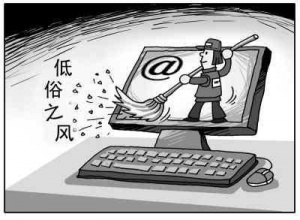“Vulgar”的版本间的差异
来自China Digital Space
小 (文本替换 - 替换“Category”为“分类”) |
|||
| 第5行: | 第5行: | ||
The government has since launched similar [http://chinadigitaltimes.net/china/internet-censorship/ Internet censorship] and [http://chinadigitaltimes.net/china/anti-vulgarity-campaign/?view=all/ anti-vulgarity campaigns]. | The government has since launched similar [http://chinadigitaltimes.net/china/internet-censorship/ Internet censorship] and [http://chinadigitaltimes.net/china/anti-vulgarity-campaign/?view=all/ anti-vulgarity campaigns]. | ||
| − | [[ | + | [[分类:Lexicon]][[分类:Censorship and Propaganda]] |
2023年8月7日 (一) 05:02的最新版本
dīsú 低俗
In January of 2009, China announced a crackdown on “vulgar” websites. The campaign identified many leading Internet companies, including Google and Baidu, for failing to comply with government censorship directives. While the language of the official campaign directive focused on erotic, violent, and drug-related content, netizens suspected that the crackdown was fundamentally aimed at eradicating politically sensitive content and launched an online protest. Han Han, one of China’s most popular bloggers, wrote a post titled “From Now On, I’m a Vulgar Person” in defiance of the crackdown.
The government has since launched similar Internet censorship and anti-vulgarity campaigns.





